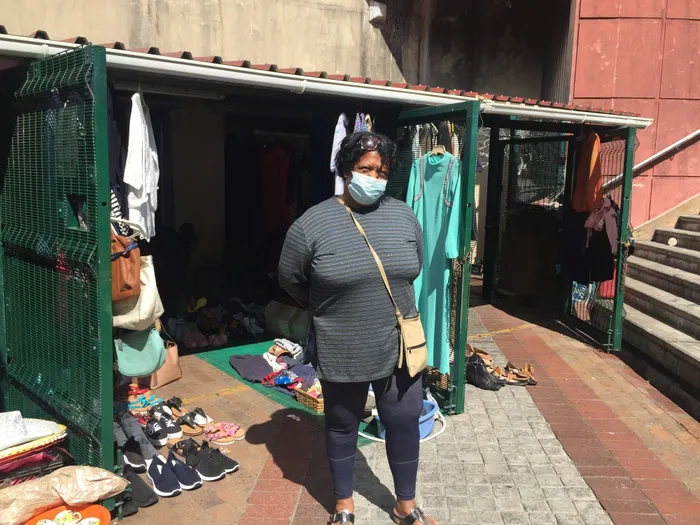Traders blame squatters for driving off customers

Marie Manasse, from Lotus River, has been a trader in Mowbray for 30 years.
By Sukaina Ishmail
Mowbray traders who rent kiosks from the City to sell their wares say nearby squatters, who openly use drugs and treat the area like a toilet, are chasing their customers away.
The kiosks are at the Mowbray transport interchange on the corner of Long and Princess streets, and the squatters have put up shelters and tents just metres away. They have been there since lockdown started last year.
The traders pay the City R214 a month for a kiosk or half that to share one, but they say it has been hard for them to make money since the squatters arrived.
“I am a pensioner with three grandchildren that I look after,” said trader Marie Manasse from Lotus River. “The trading kiosk is extra income to help me pay for their schooling. I have been trading in Mowbray for more than 30 years to make ends meet.”
The traders often only started working at 11am because they waited for the homeless people to leave, she said.
“The area is dirty after they leave, and they urinate close to our kiosks during the night leaving a strong stench.
“The homeless people fight with each other every night and have dangerous weapons out in the open. Drugs are also sold and used daily in the public and on the grass where their tents are put up. It has become such an eye-sore.”
City Law Enforcement had removed the tents last week, but the homeless had returned the next day, she said.
“The homeless are also finding their way inside our kiosks, which we are able to lock up with the cages that were provided to us by the City.”
Alec Johnson, a trader from Montevideo, said: “I have been a trader here for 24 years, and this is my main source of income. Business has been very bad ever since the lockdown, mainly because there are no transport services for people anymore and many are working from home.”
And customers were staying away from the kiosks because of the squatters, he complained.
“We have to take the risk of leaving our products inside the locked kiosk cages, because we are not able to take all of our goods home every day after work,” he said.
Before lockdown, he had earned R1000 or more in a day, but now he made less than half that and some days he made nothing, he said.
City spokesman Luthando Tyhalibongo said the squatters had told City staff that the only help they wanted was housing.
Ward 57 councillor Yusuf Mohamed, who met with the traders on Monday, said that while life was hard for those sleeping on the streets, that did not give them the right to intimidate or obstruct others. And the open dealing of drugs was also unacceptable.
He said he would meet with Law Enforcement, the City’s social development department and the City Improvement District over the issue.
“We will be thinking out of the box and trying new options this time. There are alternatives to sleeping on the street, and it will take a societal approach with a concerted effort to get these individuals away from a life on street and towards a life of dignity.”
A resident of nearby Highbury Court, who did not want to be named, said there were up to 20 squatters living at the site.
“I have lived in Mowbray since 2009, in an apartment that oversees Princess Street where the homeless people are currently squatting. I have never experienced this homeless problem prior to the first lockdown.
“The homeless people use foul language, they do not clean up the space, they are noisy during the day and night, and the area is used openly for their ablution. The security guards and police are not visible enough in this area.”
When the Tatler visited the area, we noticed a group of about 10 squatters milling about the cluster of tents and makeshift shelters. However, we did not approach them for comment as at least one of them was carrying a knife, which he openly displayed.


